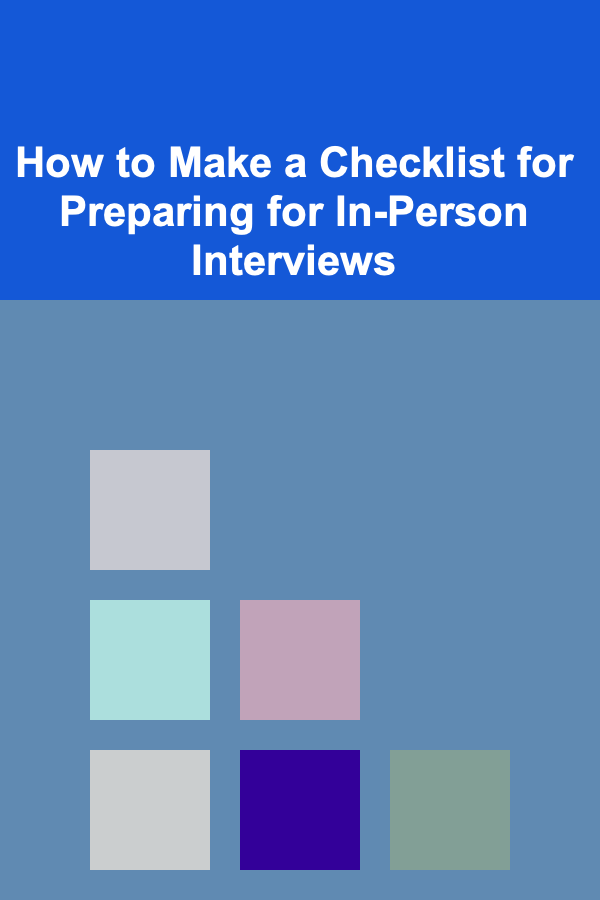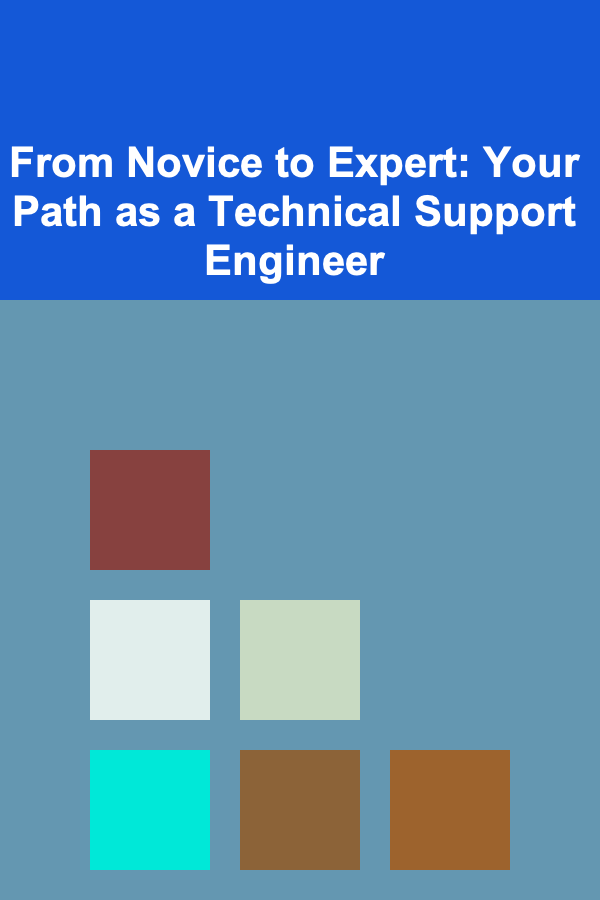
How to Make a Checklist for Preparing for In-Person Interviews
ebook include PDF & Audio bundle (Micro Guide)
$12.99$11.99
Limited Time Offer! Order within the next:

In-person interviews are an essential part of the hiring process, allowing employers to evaluate candidates on a deeper, more personal level. For candidates, the key to making a great impression and acing the interview lies in thorough preparation. A well-prepared candidate not only demonstrates professionalism but also conveys their genuine interest in the role and company. Having a structured checklist ensures that you are ready in all aspects, from appearance to research, and even the details you might overlook.
This guide will help you build an actionable and comprehensive checklist to ensure that you are fully prepared for your in-person interview, giving you the confidence to succeed.
Before the Interview: Research and Preparation
a. Research the Company
Understanding the company you are interviewing with is crucial. Knowledge of the organization's culture, mission, products, and recent news can help you stand out during the interview. Here's how to prepare:
- Company Background: Read about the company's history, mission, values, and key executives.
- Recent News and Events: Research any recent projects, news, or milestones. Knowing what's currently happening can help you ask relevant questions.
- Industry Trends: Be aware of the industry in which the company operates. Understanding industry trends and challenges can provide valuable context during the interview.
- Company Culture: Explore the company's website, social media, and employee reviews on platforms like Glassdoor to get a sense of its work culture.
b. Understand the Job Description
A clear understanding of the job description will guide your preparation, allowing you to align your skills and experience with the role's requirements.
- Key Responsibilities: Familiarize yourself with the main duties listed in the job posting.
- Skills and Experience: Review the required skills, qualifications, and experience. Be prepared to demonstrate how your background fits.
- Specific Terminology: If the role involves specific jargon or technical terms, ensure that you understand and can speak about them confidently.
c. Prepare Your Resume and Portfolio
You should be able to speak to every detail on your resume and portfolio. This includes:
- Update Your Resume: Ensure your resume is up to date and highlights your most relevant experience.
- Prepare Examples: If your resume mentions specific projects, be prepared to discuss them in depth.
- Bring Copies: Bring several printed copies of your resume to hand out to interviewers, especially if the interview involves multiple people.
d. Anticipate Common Interview Questions
While every interview is different, many questions are common across most interviews. Prepare answers to these typical questions:
- Tell me about yourself.
- Why do you want to work here?
- What are your strengths and weaknesses?
- Why are you leaving your current job?
- Where do you see yourself in five years?
Use the STAR (Situation, Task, Action, Result) method to structure your answers to behavioral questions, focusing on concrete examples from your past experience.
e. Prepare Questions for the Interviewer
Towards the end of the interview, you'll likely be asked, "Do you have any questions for us?" Always have thoughtful questions prepared to show your interest in the role and company.
- Company Culture: "Can you tell me more about the team I'll be working with?"
- Role-Specific: "What are the immediate challenges for this role?"
- Growth Opportunities: "What opportunities for growth and development does this role offer?"
Make sure your questions are relevant and show you've done your homework about the company.
Day Before the Interview: Final Preparations
a. Plan Your Journey
Logistics play a big role in reducing pre-interview stress. Plan your route ahead of time:
- Location and Time: Confirm the address, and note the exact time of the interview.
- Travel Time: Calculate how long it will take to reach the interview location, accounting for traffic or potential delays.
- Alternative Routes: If the weather is bad or there are road closures, plan alternative routes to avoid being late.
b. Prepare Your Outfit
Your appearance is the first thing an interviewer notices, so it's important to dress appropriately. Ensure your outfit is professional, well-fitted, and suitable for the company's culture.
- Research Dress Code: If possible, observe the company's dress code, whether it's business formal, business casual, or casual.
- Plan Ahead: Choose your outfit the day before, and make sure it's clean and pressed.
- Comfort: Ensure your clothes and shoes are comfortable, as discomfort can affect your confidence and performance.
c. Gather Your Materials
Make sure you have all the materials you'll need for the interview:
- Resume Copies: Bring at least three copies of your resume, even if you submitted it online.
- Portfolio: If relevant, bring a portfolio showcasing your work.
- Pen and Notepad: Bring a pen and a notebook to take notes during the interview.
- Job Description: Have a printed copy of the job description in case you need to refer to it.
d. Rehearse Your Answers
Take a moment to rehearse your answers to key interview questions. If you feel nervous, practice in front of a mirror or with a friend.
- Mock Interviews: Consider holding a mock interview with a trusted friend or mentor to receive feedback on your responses and body language.
- Body Language: Practice maintaining eye contact, offering a firm handshake, and sitting up straight---these are all essential aspects of good interview body language.
e. Get a Good Night's Sleep
Rest is crucial before the interview day. Aim for at least 7-8 hours of sleep to ensure you are alert, focused, and energized during the interview.
On the Day of the Interview: Last-Minute Tips
a. Eat a Healthy Meal
Ensure you have a light, healthy meal before the interview. Avoid heavy foods that might make you sluggish or uncomfortable.
- Protein and Vegetables: Focus on protein-rich foods like eggs, nuts, or lean meats, and pair them with vegetables to sustain energy.
- Avoid Excess Caffeine: While coffee may help you feel awake, excessive caffeine can lead to jitters or anxiety.
b. Arrive Early
Aim to arrive 10-15 minutes before the interview time. This gives you a moment to compose yourself and shows punctuality.
- Use Extra Time Wisely: If you arrive early, use the time to gather your thoughts, review your notes, and calm your nerves.
- Be Courteous: When you arrive, be polite and greet the receptionist or anyone you meet with a smile.
c. Review Your Notes
Before entering the interview room, take a moment to review your resume, key talking points, and the questions you want to ask.
- Stay Calm: Take deep breaths and remind yourself that you're prepared and ready for this moment.
- Positive Visualization: Visualize yourself succeeding in the interview, as a positive mindset can help alleviate stress.
During the Interview: Acing the Conversation
a. Confidence and Communication
Once the interview begins, focus on communicating clearly and confidently. Use the following strategies to stay on track:
- Listen Carefully: Make sure to listen carefully to each question. If you don't understand, it's okay to ask for clarification.
- Keep Your Answers Concise: Respond thoughtfully, but avoid rambling. Stick to the relevant points that highlight your qualifications.
- Be Honest: If you don't know the answer to a question, admit it honestly, but also show your willingness to learn.
b. Showcase Your Fit
Throughout the interview, emphasize how your skills, experience, and values align with the company and the role. Demonstrating cultural fit is just as important as showing your technical qualifications.
- Tailor Your Responses: Frame your responses to show how your experience meets the specific needs of the role.
- Emphasize Soft Skills: Companies value candidates who possess strong communication, teamwork, and problem-solving abilities. Highlight these traits in your answers.
c. Body Language
Your body language plays a significant role in how you are perceived during the interview. Maintain good posture, make eye contact, and smile when appropriate.
- Relaxed Demeanor: While it's normal to feel nervous, try to remain calm and composed. A relaxed posture will make you appear more confident and approachable.
- Handshake: A firm handshake can leave a positive first impression.
After the Interview: Follow-Up
a. Send a Thank-You Email
After the interview, send a thoughtful thank-you email within 24 hours. This expresses gratitude and reinforces your interest in the position.
- Personalize the Message: Reference something specific from the interview that highlights your interest in the company or role.
- Keep It Short: A brief, sincere thank-you is sufficient. Reaffirm your enthusiasm and appreciation.
b. Reflect on Your Performance
Take some time to reflect on how the interview went. Think about the questions that challenged you and your responses, and note any areas where you could improve for next time.
- Continuous Improvement: Consider practicing more before future interviews and improving your answers where necessary.
Conclusion
Preparing for an in-person interview requires attention to detail, research, and self-reflection. By following this checklist, you'll ensure that you're not only well-prepared but also confident and ready to make a lasting impression. With the right preparation and mindset, you can tackle your interview with ease and increase your chances of landing the job.

From Novice to Expert: Your Path as a Technical Support Engineer
Read More
How to Keep Your Home Safe with Regular Security System Maintenance
Read More
How to Make Your First Christmas in a New Home Special
Read More
How To Master Influencer Marketing for Small Businesses
Read More
How to Start a Family Cooking Tradition with Simple Recipes
Read More
How to Streamline Your Home Budget to Make More Room for Savings
Read MoreOther Products

From Novice to Expert: Your Path as a Technical Support Engineer
Read More
How to Keep Your Home Safe with Regular Security System Maintenance
Read More
How to Make Your First Christmas in a New Home Special
Read More
How To Master Influencer Marketing for Small Businesses
Read More
How to Start a Family Cooking Tradition with Simple Recipes
Read More